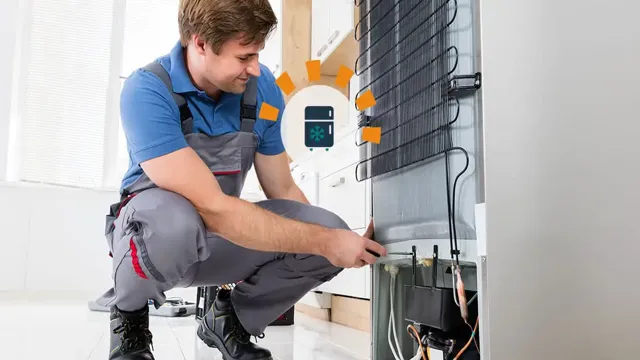If you have an old refrigerator or air conditioning unit lying around your house and you’re thinking of getting rid of it, you must know that it’s not as simple as just throwing it away. It has to be disposed of properly, and the first step towards that is cleaning up the Freon in it. Freon, also known as refrigerant, is a chemical compound commonly used in cooling systems.
However, Freon can have damaging effects on the environment if not disposed of correctly. Cleaning up Freon can be a daunting task, but with the increasing awareness of environmental issues, it’s become necessary. But, where do you start, and what do you need? This comprehensive guide has got you covered.
We’ll be taking you through the process of safely and efficiently disposing of Freon, giving you all the information you need on how it’s done and what precautions to take. Whether you’re a homeowner or responsible for managing HVAC equipment in a facility, this guide will provide you with all you need to know to do the job correctly. So, grab a cup of coffee and get ready to learn everything you need to know about cleaning up Freon.
Introduction
If your air conditioner or refrigerator is leaking Freon, it’s essential to take action immediately to prevent harm to the environment and those around you. Freon consists of harmful chemicals that can cause respiratory problems, and exposure to high levels can be fatal. Cleaning up Freon is a multi-step process that requires special equipment, training, and proper disposal methods.
But when exactly is it necessary to remove Freon from your AC unit? It’s not something you need to do regularly. However, certain situations demand it, such as a leak in the system or other technical issues that compromise its efficiency.
Before you rush to handle Freon removal yourself, remember that it’s crucial to have professional guidance. An AC technician can accurately assess whether Freon needs to be removed and manage the entire process. They have the expertise to ensure it’s done safely and according to environmental regulations. This approach not only protects you and your household but also ensures compliance with legal standards for hazardous materials.
When is Freon Removal Necessary?
It’s crucial to understand that removing Freon from your AC unit isn’t a task that needs regular attention. However, certain situations demand immediate action:
- Leaks in the System: A leak is a clear indicator that Freon needs to be removed and the system repaired.
- System Malfunctions: If your AC isn’t functioning properly, a technician may recommend Freon removal as part of the troubleshooting process.
Professional Intervention
Freon removal should not be a DIY project. Only a certified AC technician should handle this process due to the complexities and legalities involved. They will ensure that the Freon is safely removed and disposed of in accordance with environmental regulations. Always consult with a professional if you’re unsure whether Freon removal is necessary for your situation. It’s not something that you should take lightly or attempt to do yourself.
To mitigate these risks, it is crucial to prevent exposure by ensuring your air conditioning unit is inspected regularly for any leaks. Regular maintenance by a professional can help detect potential issues early and prevent the release of Freon into your environment.
Attempting to handle Freon on your own, especially if you lack proper training, can be dangerous. Professional intervention is necessary not only to address leaks but also to handle the chemicals safely and in compliance with environmental standards.
By understanding these precautions and the serious nature of Freon exposure, you can better protect your health and ensure the safe operation of your cooling systems. The first step is to call a licensed professional who specializes in freon cleanup and removal. They will come to your location, assess the situation, and employ the necessary measures to clean up and dispose of the hazardous waste safely.
Remember, cleaning up freon requires the right knowledge, training, and equipment to be handled correctly. So, if you suspect a freon leak, don’t hesitate to contact a professional to handle it for you.
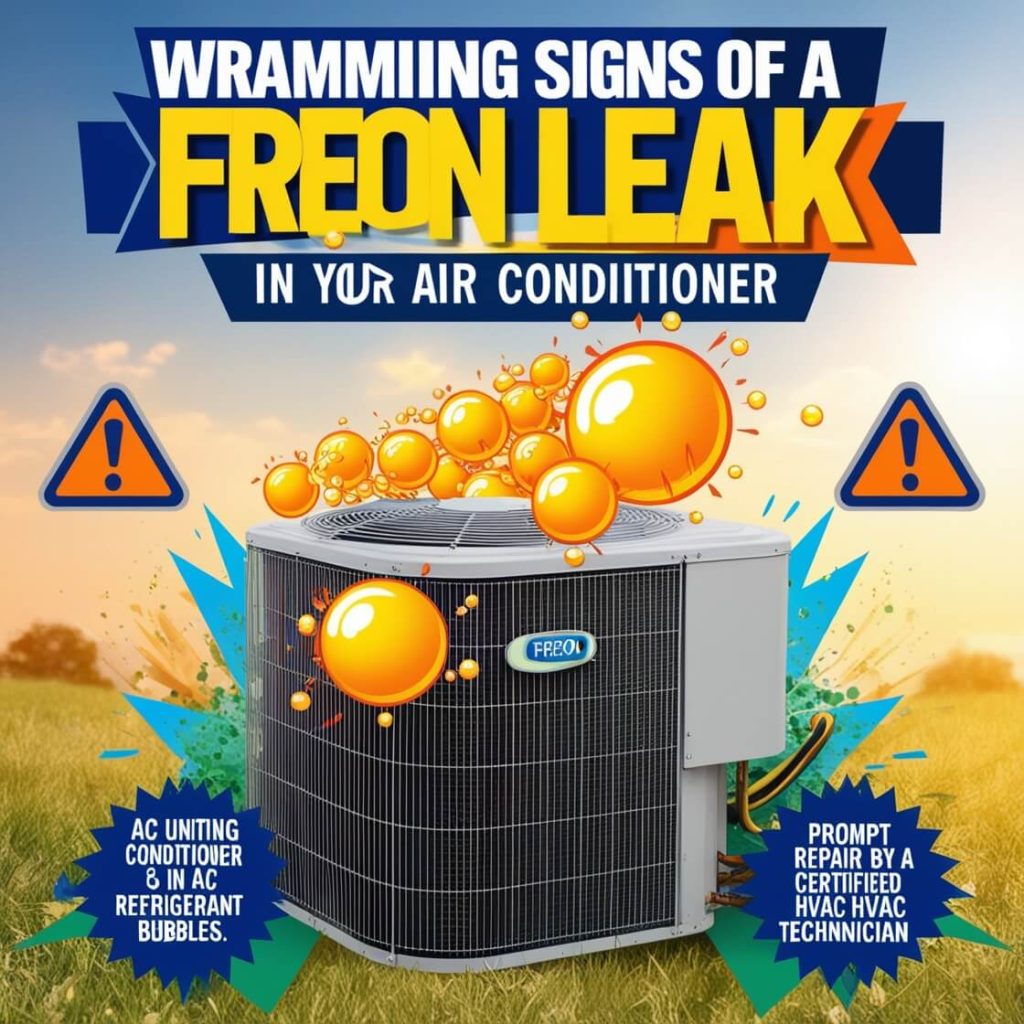
Understanding Freon and Its Dangers
Freon is a commonly used term in the air conditioning and refrigeration industry. But what exactly is Freon and why is it so significant? In short, Freon is a brand name for a type of refrigerant that’s been widely used since the early 20th century. It is a colorless gas that is typically used in air conditioning and refrigeration systems to cool down the air.
While Freon has been popular for years due to its effectiveness, it has been found to pose serious dangers to humans and the environment. This is because Freon is a chlorofluorocarbon (CFC) that has been linked to the depletion of the ozone layer and global warming. As a result, governments across the world are taking measures to phase out the use of Freon in an effort to mitigate its negative impact.
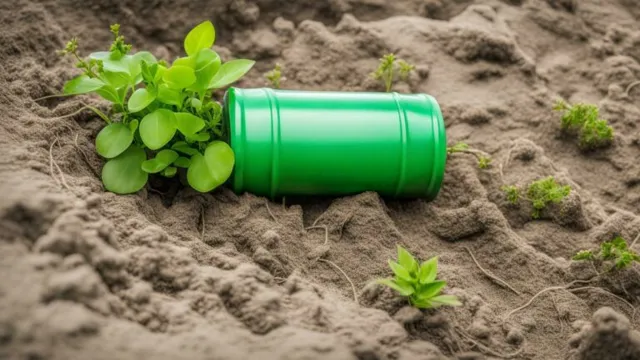
Why You Should Never Attempt to Clean Up Freon Yourself
Freon, clean up If you have an air conditioner that uses Freon as a refrigerant, it’s important to know that you should not attempt to clean up any leaks or spills on your own. Freon is a hazardous substance that can cause harm to you and the environment, and requires specialized equipment and training for proper cleanup. Freon leaks can occur due to a variety of reasons, such as poor maintenance, damage to equipment, or aging systems.
In any case, if you suspect a Freon leak, it’s best to contact a licensed professional who can evaluate the situation and take appropriate action to prevent any harm. Taking matters into your own hands can prove hazardous and lead to serious consequences.
Freon, the refrigerant commonly found in air conditioners and refrigerators, keeps us cool but poses a risk if not handled properly. While a leaking AC might seem like a DIY project, Freon cleanup is a job best left to trained professionals. Here’s why:
Safety First:
Freon inhalation can cause respiratory problems, skin irritation, and even be fatal in high concentrations. Certified technicians have the proper gear and knowledge to safely handle Freon during recovery and disposal. This expertise is not just beneficial but legally required, ensuring that only qualified professionals manage the process. Handling Freon is complex and requires adherence to strict safety protocols to prevent environmental harm.
Professionals possess the specialized tools necessary for the task—equipment that is both expensive and tailored specifically for safe Freon recovery. Attempting to manage Freon without these tools can lead to dangerous outcomes.
Moreover, certified technicians are well-versed in the proper disposal methods. Freon disposal must follow precise procedures to mitigate its environmental impact. By entrusting this process to experts, you ensure compliance with environmental regulations and contribute to a safer ecosystem.
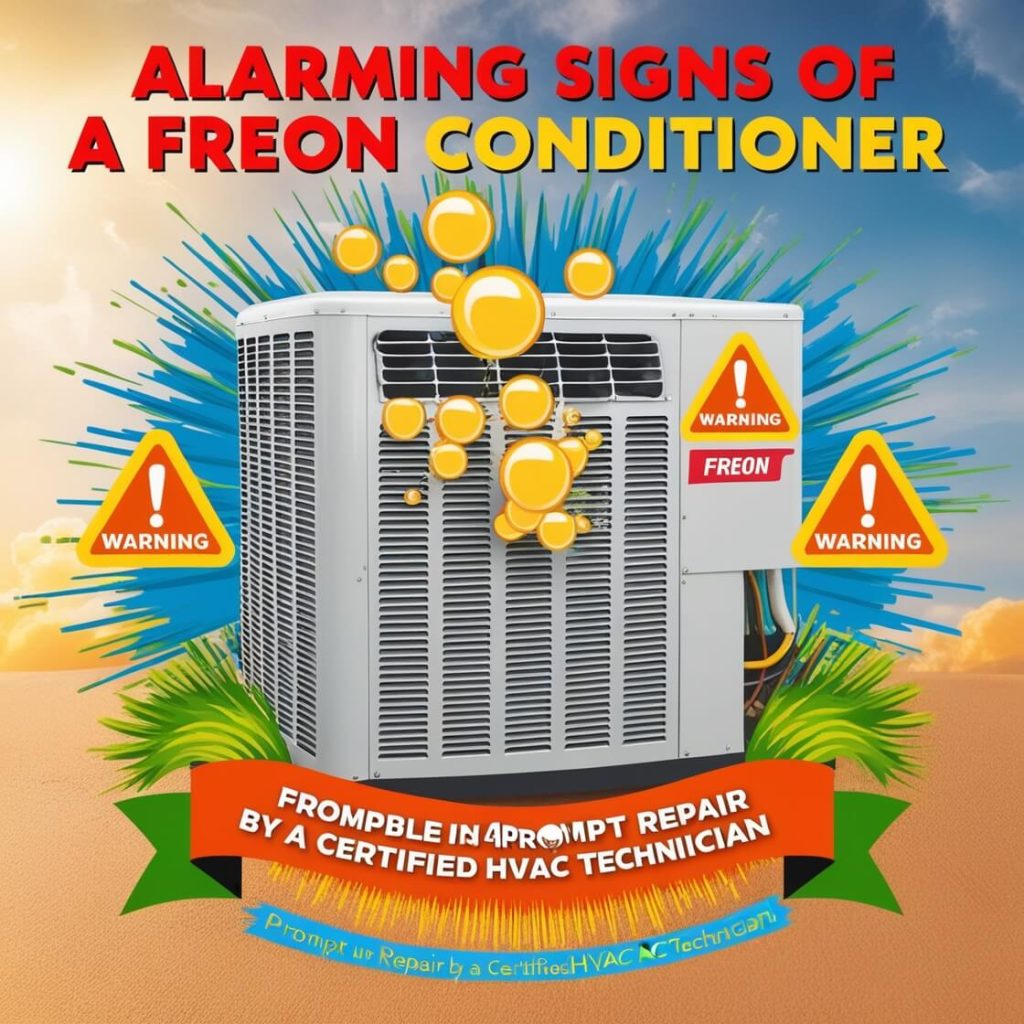
Environmental Responsibility:
Freon release damages the ozone layer. Professionals ensure proper recycling or destruction of Freon according to environmental regulations.
When recycling Freon, technicians send it to an EPA-certified reclaimer. These reclaimers clean and recycle the old Freon so it can be used in other AC units, minimizing waste and environmental impact.
In cases where Freon must be destroyed, specific procedures are followed to conduct this safely. Specialized plants are equipped to handle the destruction process, ensuring no harm comes to people or the environment.
For storage, certified professionals adhere to strict guidelines. Containers are labeled accurately and stored away from other materials. Moreover, Freon is only stored for a limited time before it is disposed of, aligning with safety and environmental protocols.
The Not-So-Simple Cleanup: Recovering Freon requires specialized equipment and a vacuum pump to safely remove it from your AC unit. Without proper experience, you risk incomplete removal, leading to inefficiencies and further leaks.
Comprehensive Approach to Freon Handling
Professional HVAC technicians come prepared with a complete toolkit designed for both removal and proper disposal. These tools are often costly and complex, making them impractical for the average homeowner to own. Beyond just the removal, these experts ensure that Freon is disposed of according to environmental standards, preventing potential harm to the environment. Their training and expertise ensure the job is done efficiently and safely, safeguarding both your home and the planet.
By relying on professionals, you benefit from their knowledge and equipment, ensuring that every aspect of Freon handling is conducted with precision and care.
Professional technicians arrive equipped with all the necessary tools designed specifically for Freon extraction and any subsequent maintenance tasks. This includes a variety of gauges, recovery machines, and leak detectors that ensure the job is done thoroughly and safely.
As a homeowner, investing in such equipment can be prohibitively expensive, often costing a substantial amount of money. Moreover, without the right expertise, using these tools can lead to improper handling, exacerbating existing issues. Trusting professionals means you benefit from both their tools and their extensive experience, ensuring your AC unit functions efficiently and safely.
What You Can Do:
Preventing Freon Exposure: A Proactive Approach
To prevent exposure to Freon, it’s crucial to focus on regular maintenance and professional care. Here’s how you can ensure your air conditioning unit remains safe and efficient:
- Schedule Regular Inspections: Arrange for routine checks by a certified HVAC technician. This proactive measure helps detect potential leaks early and prevents exposure.
- Avoid DIY Freon Handling: Freon management should always be left to professionals. Attempting to remove or handle Freon without proper training is risky and can lead to exposure.
While you can’t tackle the Freon itself, here’s how to be proactive:
- Spot the Leak: Signs of a Freon leak include a hissing sound, reduced cooling capacity, and the presence of an oily residue around the unit.
- Call a Certified Technician: Hire an EPA-certified HVAC technician for safe Freon recovery and leak repair. Explain any concerning symptoms you’ve observed.
- Focus on Ventilation: Open windows and doors in the affected area to promote air circulation. However, avoid staying in the room yourself.
Remember: Safety and environmental responsibility come first. By understanding the risks and taking the right steps, you can ensure your air conditioner gets fixed properly and the Freon is handled by a professional. With regular maintenance and swift action, you can keep your home safe and comfortable year-round.
How Regular Inspections Can Prevent Freon Leaks in Your AC Unit
Regular inspections of your air conditioning unit play a crucial role in preventing Freon leaks, ensuring efficient operation and prolonging the life of the system. Here’s how these inspections can make a difference:
- Identifying Early Signs of Wear: Regular check-ups help detect any early signs of wear and tear on components such as valves, hoses, and connections. Addressing these issues promptly can prevent leaks before they develop further.
- Maintaining Optimal Pressure Levels: Technicians can monitor the pressure levels in your AC system to ensure they are within the recommended range. This practice minimizes the risk of strains that could lead to Freon escaping.
- Ensuring Proper Seals: During an inspection, all seals and joints are examined to make sure they’re intact. These are common areas where leaks can occur due to loosening or corrosion over time.
- Preventing Component Damage: By inspecting and cleaning the coils and evaporators, you reduce the likelihood of component damage that could inadvertently cause leaks.
- System Performance Checks: Regular assessments of the overall performance of your AC unit can highlight inefficiencies that might indicate underlying issues with Freon levels.
By integrating these inspection routines into your maintenance schedule, you can effectively guard against Freon leaks, ensuring your air conditioning unit functions efficiently and safely.
How to Safely Clean Up Freon
If you need to clean up Freon, it’s important to do so safely and correctly to ensure you’re protecting both yourself and the environment. Freon is a type of refrigerant gas commonly used in air conditioning systems, but it’s also known to be harmful to the atmosphere if released improperly.
To clean it up, you’ll need to first shut off the power to any nearby electrical equipment, including air conditioning units. Then, use a specialized Freon recovery unit, also known as a reclaimer, to safely remove the gas from the affected area. This machine captures and stores the Freon until it can be disposed of properly, ensuring no environmental contamination occurs.
Be sure to dispose of the recovered Freon at an authorized waste facility to prevent any pollution. It’s important to wear protective gear, like gloves and a mask, while handling Freon and to follow all safety guidelines provided by the manufacturer of your recovery unit. By taking these precautions, you ensure both personal safety and environmental responsibility.
By taking these precautions, you can ensure a safe and responsible cleanup of Freon.
Step-by-Step Instructions for Cleaning Up Freon
If you are dealing with a Freon leak, it is important to handle it safely and responsibly. Freon is a refrigerant that can have harmful effects on the environment, so it is essential to clean it up properly. The first step is to evacuate the area and call in a professional.
They will be equipped to handle the situation, and they can safely clean up the Freon. If you are attempting to clean it up yourself, wear protective gear like gloves and a mask and ventilate the area. Collect any visible Freon in a sealed container and contact a local hazardous waste disposal facility for assistance with proper disposal.
It is important to never release Freon into the environment, as it can harm the ozone layer. By taking these precautions, you can help protect yourself and the planet.
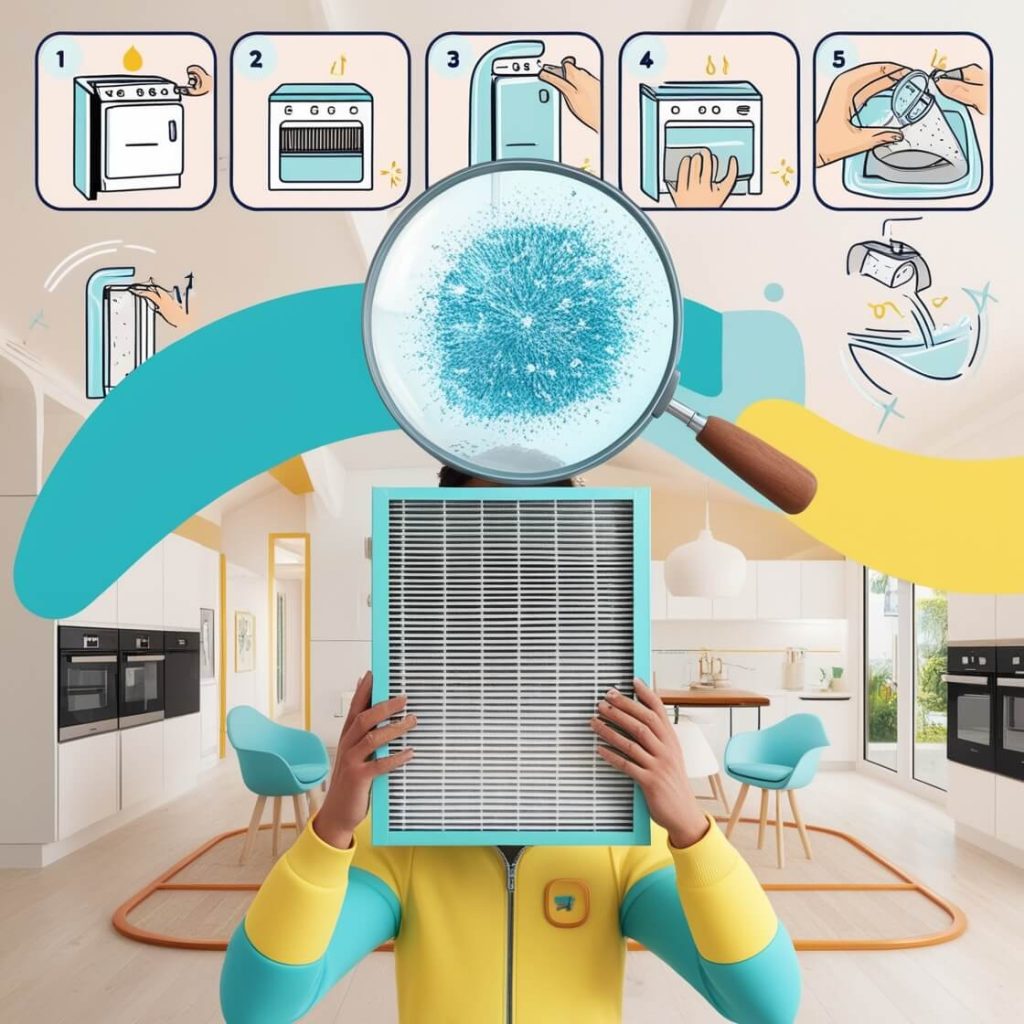
Recommended Protective Gear
When it comes to cleaning up Freon, it’s essential to take the necessary precautions to ensure your safety. As a refrigerant, Freon can cause a host of issues, including dizziness, heart palpitations, and even suffocation. That’s why wearing protective gear while handling it is vital.
To prevent inhalation, it’s essential to wear a respirator mask, particularly if you’re working in an enclosed space. Additionally, protective gloves, long-sleeved clothing, and eye protection are essential to avoid skin and eye irritation. Once you’re geared up, it’s time to tackle the cleanup process.
Start by opening all windows and doors to ventilate the room. Then, use a vacuum cleaner or shop vac to safely remove any loose particles or debris. After that, you can clean the area with a mild solution of soap and water.
These simple steps will help keep you safe while cleaning up Freon.
Disposing of Freon Properly
If you have an old air conditioning unit or refrigerator that uses Freon, it’s important to dispose of it properly when it comes time for a replacement.Freon is a type of refrigerant that can cause harm to the environment if it’s not disposed of properly. The first step in cleaning up Freon is to turn off the appliance and unplug it from the wall. Then, you’ll need to remove all the remaining refrigerant from the unit by using a recovery machine. This is a job that’s best left to a professional HVAC technician who has the proper tools and training to handle it safely. Once the refrigerant has been removed, the unit can be disposed of at a recycling center that accepts appliances. This is the best way to ensure that the Freon does not end up in landfills or other places where it can cause harm to the environment.
Recycling Freon: A Responsible Choice
After the Freon is safely extracted, it doesn’t just have to be discarded. In fact, it can be recycled, providing an environmentally friendly alternative. Here’s how it works:
- Certified Reclamation: The removed Freon is sent to an EPA-certified reclaimer. This ensures that the process adheres to strict environmental standards.
- Cleaning and Reusing: At the reclamation facility, the Freon is meticulously cleaned and purified. Once this process is complete, the recycled refrigerant can be reused in other AC units, extending its life and reducing waste.
By following these steps, not only do you help protect the environment, but you also contribute to the efficient use of resources. Whether you’re disposing of or recycling Freon, always consult with certified professionals to ensure the process is handled responsibly.
Proper Disposal Steps
- Consult a Technician: It’s advisable to get advice from your local technician on how to dispose of your old unit safely. Their expertise ensures that Freon removal is handled correctly, preventing potential leaks.
- Contact Local Environmental Offices: Reach out to your local environmental office for guidance on proper disposal. Many of these offices have specific locations where old refrigerators and air conditioning units are collected. This prevents toxic chemicals from leaking into the environment.
- Recycling Centers: After the refrigerant is safely removed, take your unit to a recycling center that accepts these appliances. This ensures the Freon does not end up in landfills or other places where it can harm the environment.
Disposing of Freon properly is not just about obeying the law, it’s also about protecting the environment we all share. Remember, each step you take toward responsible disposal contributes to a healthier planet.
What Procedures Are Followed If Freon Needs to Be Destroyed?
When Freon removal is necessary, professional AC technicians are equipped to handle the process safely. But what happens when Freon needs to be destroyed? Here is a breakdown of the procedures followed:
- Collection and Transportation: The Freon is first carefully collected from the AC system using specialized recovery equipment. This ensures that no refrigerant escapes into the atmosphere. It is then transported to a dedicated processing facility.
- Secure Storage: Once at the facility, the Freon is stored securely, usually in pressurized tanks, to prevent leaks. This ensures safety for both the environment and workers handling the material.
- High-Temperature Incineration: The destruction process often involves high-temperature incineration. During this step, Freon is burned in a controlled environment designed to break down its potentially harmful components.
- Emissions Scrubbing: After incineration, emissions are carefully scrubbed using advanced technologies. This step is crucial as it filters out harmful byproducts, ensuring that any released gases are non-toxic and environmentally safe.
- Monitoring and Compliance: Throughout the process, regulatory compliance is maintained with organizations like the EPA. This includes constant monitoring to ensure that all safety and environmental standards are met.
This meticulous process safeguards both people and the planet from any potential hazards associated with Freon disposal.
Storage Requirements for Freon Before Disposal
Storing Freon involves strict guidelines to ensure safety and compliance with environmental standards.
Certified Professionals: Only those with proper certification are authorized to handle and store Freon. This ensures that the storage process is managed by individuals with the appropriate training.
Proper Labeling: Every container of Freon must be labeled accurately. This is crucial for identifying the contents quickly, thus reducing the risk of mishandling or accidents.
Strategic Placement: Containers should be placed away from other materials and potential contaminants. This reduces the chance of chemical reactions or other hazardous situations.
Time-Limited Storage: Freon is not to be stored indefinitely. There are specific regulations regarding the duration for which it can be stored before disposal becomes necessary. This policy helps prevent degradation and reduces environmental impact.
By adhering to these guidelines, the risks associated with Freon storage can be effectively managed, promoting safety and compliance with regulatory standards.
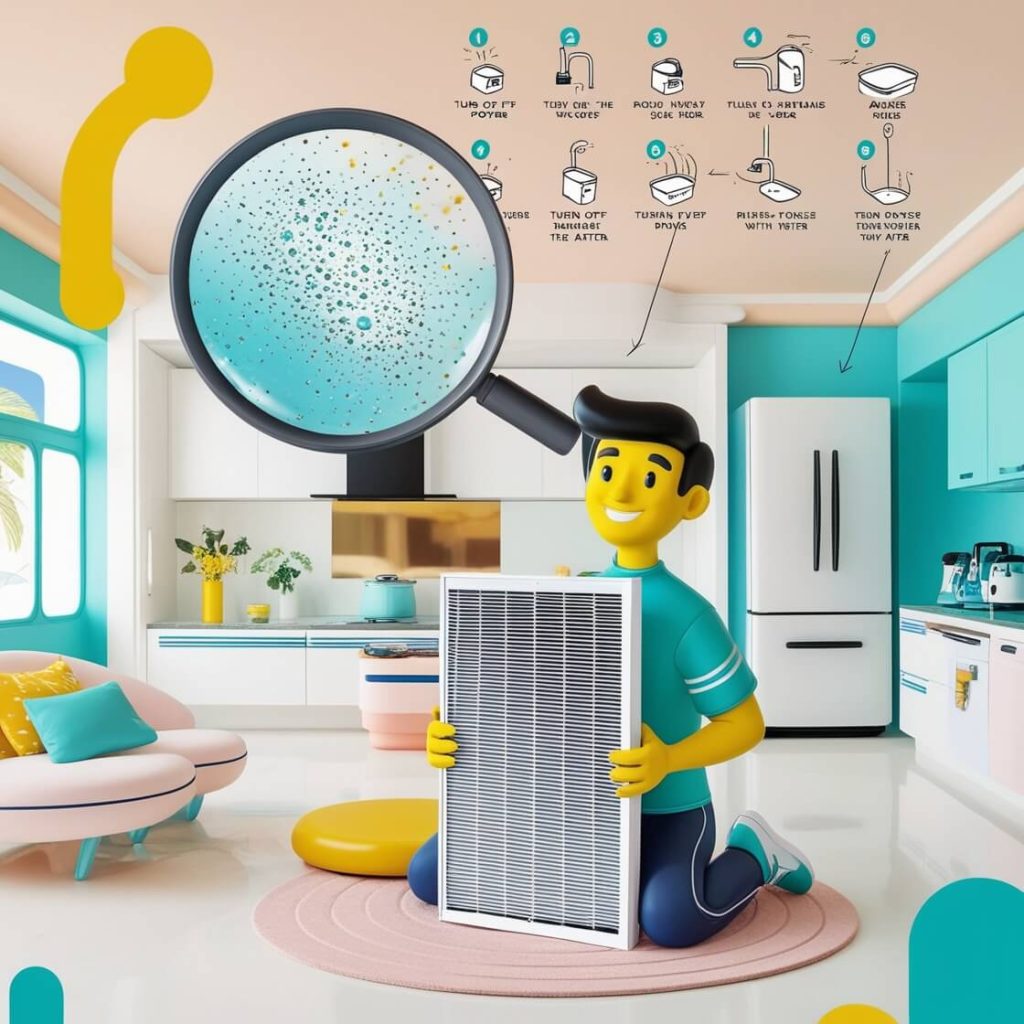
Spraying an oil like substance thru the room
Spraying an oil-like substance through a room can be dangerous depending on the substance itself and the situation. Here’s how to approach it:
Identify the Substance:
- Commercial Products: Some legitimate uses involve misting oil-based products like essential oils or light machine oils. Check the product label for safety instructions and proper application methods. Never spray these directly; use a diffuser or appropriate applicator.
- Unknown Substance: If you’re unsure what’s being sprayed, prioritize safety:
- Evacuate: Leave the room immediately, especially if you experience dizziness, coughing, or irritation.
- Ventilation: Open windows and doors for fresh air circulation.
- Identify the Source: If safe to do so, try to identify the source of the spraying. Don’t touch it directly.
- Seek Help: If you suspect a hazardous material, contact emergency services or your local poison control center.
General Precautions:
- Avoid Inhalation: Oil mist can irritate lungs. Hold your breath and leave the area if you encounter it.
- Fire Risk: Some oil-based substances can be flammable. If you suspect a fire hazard, evacuate immediately and call emergency services.
- Slippery Surfaces: Oily residue can make surfaces slippery, increasing fall risks. Be cautious after the spraying has stopped.
Additional Considerations:
- Food Safety: If the oil contaminates food preparation areas, discard the affected food and clean surfaces thoroughly.
- Property Damage: Oil mist can damage furniture and electronics. Depending on the substance, professional cleaning might be necessary.
Remember: When in doubt, prioritize safety. Leave the area, ensure proper ventilation, and seek help from professionals if needed.
Evacuating and Ventilating the Room
While you did the right thing by evacuating and ventilating the room, the oil residue from your air conditioner leak could be a health concern. Here’s how to proceed:
Safety First:
- Minimize Contact: Avoid touching the residue with bare skin. It’s best to wear gloves while cleaning.
- Ventilation: Keep the windows open for continued air circulation to remove any lingering fumes.
Investigating the Oil:
- Identify the Air Conditioner Type: If you know if your AC unit uses R-22 refrigerant (older models), the oil might be mineral oil, which can cause skin irritation.
- Consult a Professional: For the most accurate information about the oil and potential health risks, it’s best to consult an HVAC (Heating, Ventilation, and Air Conditioning) technician. They can identify the refrigerant type and advise on any specific dangers.
Cleaning the Residue:
- Non-porous Surfaces: For hard surfaces like countertops or furniture, use a mild dish soap and warm water solution. Wipe clean and dry thoroughly.
- Porous Surfaces: For carpets or rugs, tackling the oil residue can be trickier. Here are a few options, but test them on an inconspicuous area first:
- Baking Soda: Sprinkle baking soda on the affected area, let it sit for several hours to absorb the oil, then vacuum thoroughly. Repeat if necessary.
- Commercial Carpet Cleaner: Look for a product specifically designed for oil removal on carpets. Follow the manufacturer’s instructions carefully.
- Professional Cleaning: For extensive oil stains or delicate rugs, consider professional carpet cleaning services. They have the equipment and expertise to handle tough jobs safely.
Additional Tips:
- Don’t Use Harsh Chemicals: Avoid using strong solvents or abrasive cleaners, as they can damage surfaces and potentially release harmful fumes.
- Dispose of Contaminated Materials: If cleaning materials like towels or rags become heavily saturated with oil, dispose of them properly.
Remember: Safety is key. If you have any concerns about the oil or the cleaning process, don’t hesitate to consult a professional technician or carpet cleaner.
Hiring a Professional to Clean Up Freon
If you have an old appliance that contains Freon, it’s important to properly dispose of it. Freon is a chemical refrigerant that can harm the environment if not disposed of correctly. However, cleaning up Freon can be dangerous, and it’s important to hire a professional to do the job.
The cleanup process involves removing the Freon from the appliance and disposing of it in a safe manner. A professional can ensure the Freon is collected and disposed of properly, preventing harm to both the environment and your health. When hiring a professional to clean up Freon, make sure to choose a licensed and experienced technician. They should have the knowledge and expertise required to safely handle and dispose of the chemical.
If you are a homeowner, removing Freon from your air conditioning unit is discouraged. Only certified technicians with the necessary certifications are qualified to handle Freon. This ensures the task is performed safely and in compliance with environmental regulations.
By choosing a professional with the right credentials, you protect both your home and the environment. Always confirm that your technician possesses the appropriate certifications before allowing them to service your unit.
Legal Requirements for Hiring a Professional for Freon Removal
When it comes to handling Freon, legal requirements are in place to ensure both safety and environmental protection. Let’s break down these requirements to help you understand why hiring a professional is not just recommended—it’s necessary.
Legal Mandate
- Compliance with Environmental Laws: Under the Clean Air Act, the Environmental Protection Agency (EPA) mandates that only certified technicians can perform Freon removal. This is crucial to prevent the illegal release of refrigerants that can harm the ozone layer.
- Safe Handling Certification: Professionals must obtain certification through an EPA-approved program. This certification signifies they have the necessary training to handle refrigerants safely and effectively.
Why You Shouldn’t DIY
- Safety Concerns: Freon is a hazardous substance. Attempting to remove it without proper training can pose significant dangers to both health and property.
- Potential Fines: Engaging in self-removal or hiring an uncertified individual can result in hefty fines due to non-compliance with federal regulations.
Professional Advantages
- Expertise and Experience: Certified professionals have the skills and equipment needed to safely and efficiently remove Freon, minimizing risks to the environment and public health.
- Proper Disposal: They also ensure that the refrigerant is disposed of in accordance with environmental guidelines, preventing potential contamination.
In conclusion, abiding by the legal requirements for hiring certified professionals for Freon removal not only keeps you compliant with federal laws but also protects you and the environment from serious risks.
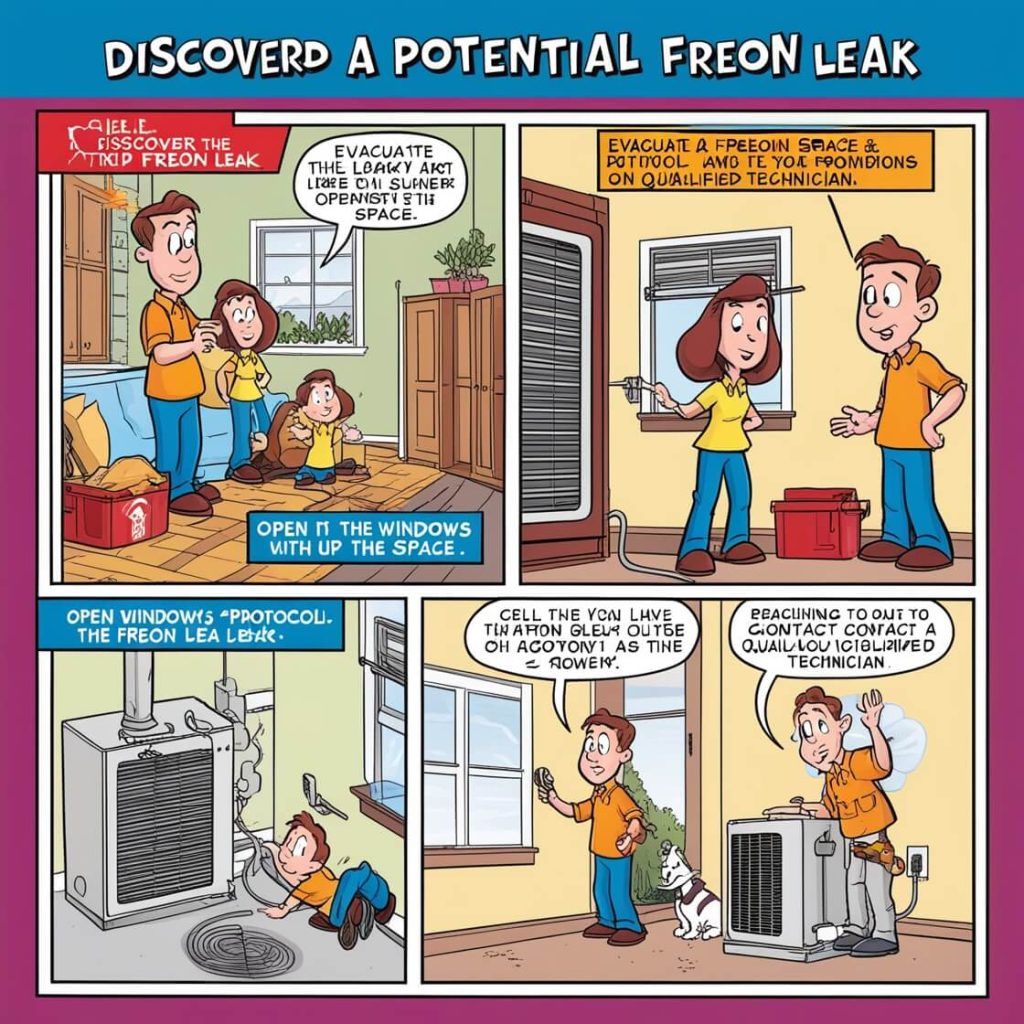
Finding a Qualified Freon Cleanup Professional
When it comes to cleaning up Freon, it’s important to hire a professional to handle the job. But how do you go about finding a qualified Freon cleanup professional? Firstly, you can search for local companies that specialize in refrigerant reclamation or Freon cleanup. Check their credentials and qualifications and see if they are EPA and OSHA compliant.
Additionally, look for companies that offer emergency services and have experience with different types of cooling systems and refrigerants. It’s also a good idea to check reviews and ask for references to ensure you’re hiring a trusted and reliable professional. By doing your research and finding a qualified professional, you can ensure that the cleanup is done safely and effectively, protecting both yourself and the environment.
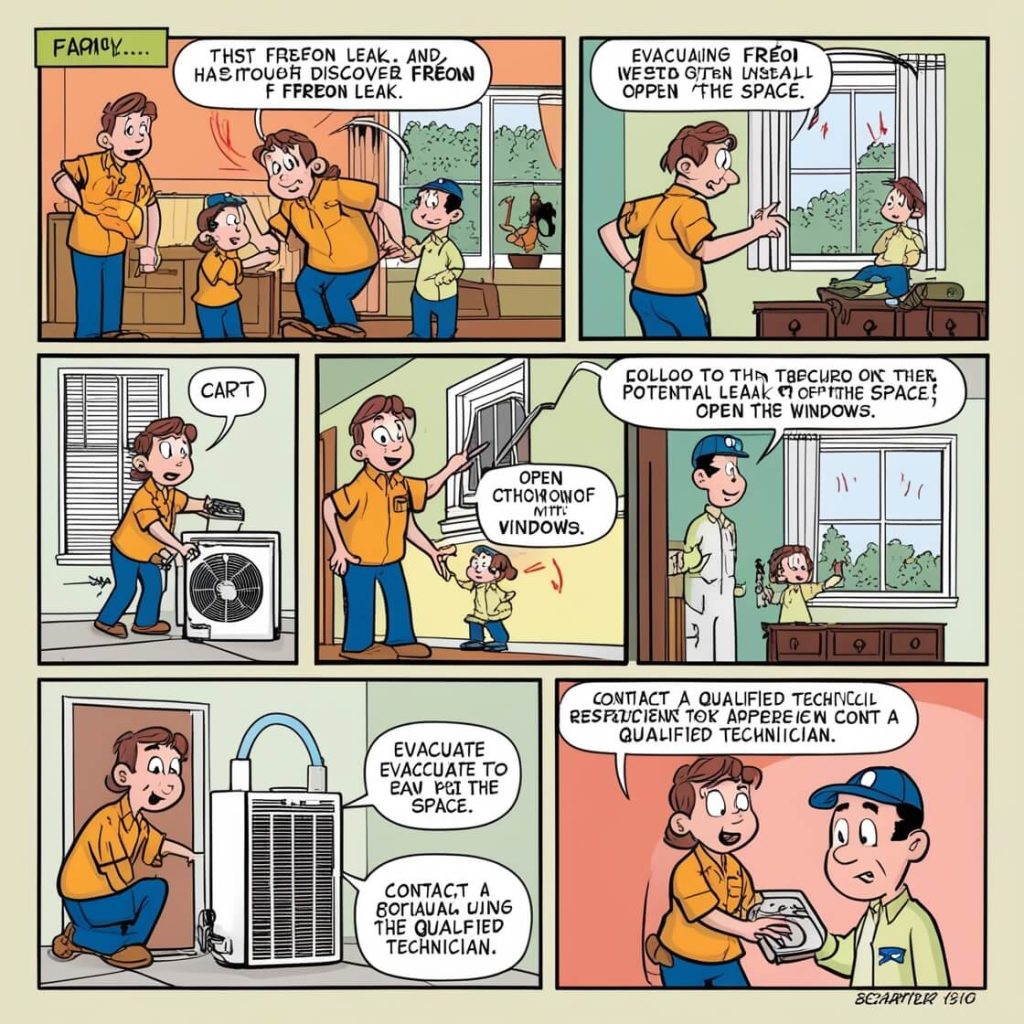
What to Expect During the Cleanup Process
When it comes to cleaning up Freon, it’s important to hire a professional who knows what they’re doing. Freon, which is a refrigerant used in air conditioning and cooling systems, is harmful to the environment and can be dangerous if not handled properly. A professional cleanup process typically involves identifying the source of the leak and assessing the extent of the damage.
The technician will then use specialized equipment to remove any remaining Freon and safely dispose of it. Depending on the severity of the leak, the cleanup process can take several hours or even days. It’s important to keep in mind that Freon cleanup is not a DIY project and attempting to do it yourself can result in serious harm.
Once the Freon is safely removed, technicians have several methods to ensure it is disposed of correctly:
- Recycling: The Freon may be sent to an EPA-certified reclaimer. Here, it is cleaned and recycled, allowing it to be reused in other AC units. This method is environmentally friendly and helps reduce waste.
- Destruction: In some cases, Freon is destroyed using specific procedures to ensure safety. Specialized plants carry out this process, minimizing any potential harm to people or the environment.
- Storage: Certified professionals are responsible for storing Freon temporarily. During storage, containers are correctly labeled and kept separate from other materials. This ensures safety until the Freon is either recycled or destroyed.
Each of these methods requires adherence to strict guidelines to prevent environmental damage and health risks, underscoring the importance of professional handling.
Hiring a professional to clean up Freon can give you peace of mind that the job is being done safely and effectively.
How Much Does It Typically Cost to Discharge and Replace Freon in an AC Unit?
If you’re considering the service of discharging and replacing Freon in your AC unit, it’s important to be aware of the potential costs involved. This process is typically handled by professional AC technicians who ensure safe handling and proper disposal, crucial for environmental safety.
Breakdown of Costs
- Freon Replacement: On average, replacing Freon can range from $100 to $250. The exact fee will depend on various factors such as:
- The size and capacity of your air conditioning unit.
- Your geographical location, as regional pricing can vary.
- Disposal Fee: Proper disposal of the old Freon is vital, as it can be harmful to the environment. This service often costs around $100. This fee covers the safe extraction and disposal methods required by environmental regulations.
Factors Influencing the Costs
- AC Unit Size: Larger units generally require more Freon, leading to higher costs.
- Location: Prices can fluctuate based on your local market rates and any regional regulations regarding Freon disposal.
- Service Provider Rates: Different professionals might have varying fees based on their expertise and operational costs.
Overall, budgeting around $200 to $350 should cover the service, but getting a personalized quote from a local AC technician is advisable to get the most accurate estimate for your specific needs.
What is the Cost Range for Discharging and Replacing Freon?
The expense of discharging and replacing Freon in your air conditioning system can vary significantly. Typically, you can expect to pay anywhere from $100 to $250. This range depends on factors like the size of your AC unit and your geographical location.
In addition to the replacement cost, there is usually an additional fee—averaging around $100—for the environmentally responsible disposal of the old Freon. This step is essential to prevent harm to the environment and is a standard practice when dealing with refrigerants.
Conclusion
Well folks, cleaning up Freon is no laughing matter. Not only is it harmful to the environment, but it’s also illegal to release it into the atmosphere. The best way to clean it up is to call a professional who is certified to handle the task.
Don’t risk it, leave it to the experts and save the planet one Freon cleanup at a time!”
FAQs
What is freon and why is it harmful to the environment?
Freon is a colorless gas commonly used to cool refrigerators and air conditioners. However, it is harmful to the environment because it depletes the ozone layer and contributes to global warming.
How can I safely dispose of freon?
“It is illegal to release freon into the atmosphere or dispose of it in regular trash. You should contact a licensed professional who can safely remove and dispose of freon according to EPA regulations.
Hiring a professional is not just a recommendation—it’s a legal requirement. Attempting to remove Freon on your own can be hazardous and is against the law. Professionals have the necessary skills and experience to handle Freon safely and in compliance with all relevant regulations. By engaging a certified technician, you ensure the process is conducted properly, minimizing environmental impact and adhering to legal standards.”
How to remove Freon from an air conditioner?
We strongly advise against removing Freon yourself. Freon removal requires specialized equipment and training to ensure safety and environmental regulations are met.
To properly remove Freon, a special machine called a reclaimer is used. This machine safely captures the Freon and stores it until it can be disposed of properly, preventing environmental contamination. Handling this process without the right tools can lead to significant risks.
Here’s the recommended approach:
- Call a certified HVAC technician. They can safely recover the Freon, diagnose the leak in your AC, and perform repairs. These professionals are trained to use the reclaimer, ensuring that the Freon is managed according to industry standards.
By relying on a certified technician, you ensure that your AC unit is serviced correctly while also contributing to environmental safety.
Show Sub-Questions
Their Answer vs. Yours
Can you release Freon into the air?
Absolutely not! Releasing Freon into the air is harmful to the environment. Freon contributes to ozone depletion, impacting the Earth’s protective layer.
How to evacuate an AC system without a pump?
Evacuating an AC system safely and completely requires a vacuum pump. Without a pump, you risk improper evacuation, leading to moisture and contamination in the system, reducing its efficiency and lifespan.
How do I clean the inside of my air conditioner without removing it?
There are ways to clean some parts of your AC unit yourself:
- Turn off the AC and unplug it.
- Clean the air filter: Locate and remove the air filter, wash it with warm soapy water, and dry it completely before reinserting.
- Vacuum the exterior fins: Use a soft brush attachment on your vacuum cleaner to remove dust and debris from the outdoor unit’s fins.
For a more thorough cleaning or if you suspect a leak:
- Call a certified HVAC technician. They have the expertise and tools to safely clean internal components and address any leaks.
Can freon leaks be repaired or do they require full replacement of the system?
Depending on the severity of the leak, it may be possible to repair the system. However, it is recommended to have a professional assess the situation to determine the best course of action.
What are some alternatives to freon for cooling systems?
There are several alternatives to freon, such as hydrofluorocarbons (HFCs) and hydrocarbons (HCs). It is important to research and choose the most environmentally-friendly and energy-efficient option for your specific cooling needs.

